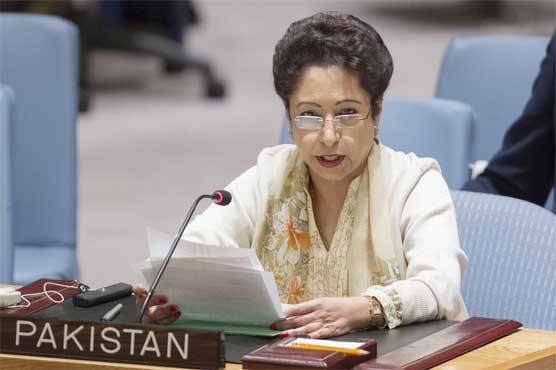NEW YORK: Pakistan has ardently admonished the new President elect Donald Trump’s administration to play a more proactive role in reducing tensions between India and Pakistan resulting from the “inflamed” situation in Kashmir and help resolve this decade old dispute to bring in peace and prosperity in the region.
“I think that can only happen if the United States has a more balanced policy in South Asia,” Pakistan Ambassador to the United Nations Maleeha Lodhi said during a wide ranging discussion at the platform of a Washington based think tank “World Affairs Council” dedicated to open discourse across sectors to better inform on timely matters of global importance.
Ambassador Lodhi had a discussion with US Congressman James Moran at the Pakistan Mission to the United Nations in New York.
When questioned about tensions between Pakistan and India, she said the United States is in a unique position as it has good relations with both Islamabad and New Delhi, enabling it to play a role of building bridges between two countries.
“Somebody needs to play this role and we think the United States is in the best position to do that,” the Pakistani envoy said. “I mean at this point in time, for example, the situation in Kashmir the long standing dispute between Pakistan and India—is once again inflamed; the situation is grave, it poses a critical threat to regional peace and security and again, you know, what we like to see is the United States not coming as a fire brigade to put out a fire but to come in at a time where it can avert any kind of crisis from brewing and exploding actually.
Further extending her call for a more balanced policy in South Asia, Ambassador Lodhi said, “In recent years we in Pakistan have felt that the United States lacked balance in its approach to South Asia, and as a result we lost something in the relationship.”
She said the lack of balance was best seen in the nuclear deal—the civilian nuclear deal that the Bush administration pursued and in fact concluded with India—which was a discriminatory nuclear policy towards the region and had consequences for it.
Asked whether a plebiscite in Kashmir could pave the way to peace, Ambassador Lodhi referred to a series of UN Security Council resolutions calling for enabling the Kashmiri people to determine their own destiny that have not been implemented.
“We say and I have said that several times at the UN that the people of Kashmir have waited for seventy years to see justice done to their cause, to see Security Council resolutions being implemented, so we do believe that the answer to the instability in our region which is caused by primarily and principally the dispute over Kashmir should be resolved.”
“This is no piece of real estate that Pakistan and India is fighting over, this is about people, it is about the self determination of the people and their right to their self determination is enshrined in the UN charter in UN declarations and in UN Security Council resolutions all we say is allow the people of Kashmir to decide their future.”
Regretting the continuing tensions between India and Pakistan, Ambassador Lodhi underscored the need for a dialogue to resolve the Kashmir and other issues between the two countries.
“It is important that Pakistan and India sit down and find a peaceful settlement of this issue to allow the people one fifth of mankind (living in South Asia) to enjoy the fruits of peace,” she said. “Peace that other parts of the world has enjoyed, why should over a billion people be deprived of this.”
The Pakistan envoy also suggested that the new U.S administration should start a peace process in Afghanistan for which Islamabad would be willing to play a role to end this war that has brought so much grief to the people living in Afghanistan and Pakistan.
“We host so many refuges, and quite apart from that, the conflict has destabilized large parts of the border,” she said, adding, “So I think in this region there is a lot that the United States can do and I think one of the mechanisms that has been evolved to help promote peace and a dialogue between the insurgents and the Afghan government in Afghanistan is called the Quadrilateral Coordination Group which brings together Pakistan, Afghanistan, China and United States.
“So I think if the new administration fully backs this mechanism and, through this mechanism, is able to conclude Afghanistan’s long war, it would make a huge contribution to regional peace and a huge contribution to world peace.
On terrorism, Dr Maleeha also outlined Pakistan’s policy to deal with the menace in detail, and said, “You have to deal with the underlying factors that lead people towards radicalization and therefore the need to address disputes in our region because that leads to violent reactions. She said Pakistan is determined to fight until we will eliminate the last terrorist from Pakistan.
“This is not something that we take lightly. This is something that we address very seriously but as I said we had to adopt a much more comprehensive approach to this phenomena rather than just rely on military means. Military means are important, necessary but not sufficient and I think that’s the lesson that the international community has also learnt.”
On countering aggressive extremism, Ambassador Lodhi said the military campaign was being followed up by rehabilitation of the tribal areas that are cleared of militancy and terrorists. The National Action Plan, drawn up by the government of Prime Minister Muhammad Nawaz Sharif, includes steps to address violent extremism, she pointed out. “This is not just for the government to do but this is for the society to join with the government and also address some of the educational challenges and involves citizens of our country to confront and to defeat this menace.”






